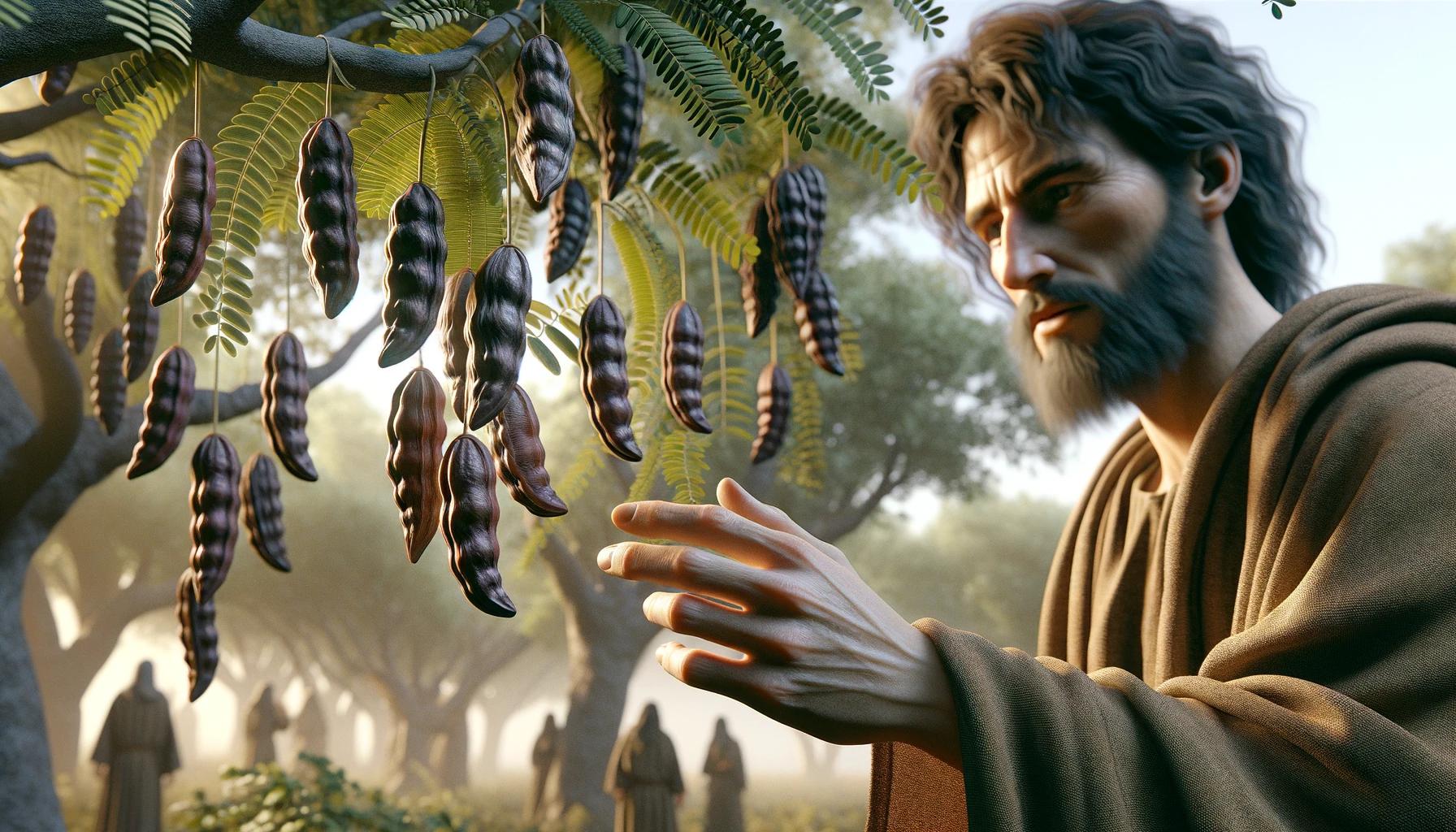Home>Christian Videos>Bible Stories>Why Did John The Baptist Eat Honey And Locusts


Bible Stories
Why Did John The Baptist Eat Honey And Locusts
Published: March 6, 2024
Ericka Andersen, an editor at Christian.net, expertly merges digital strategy with content creation, focusing on faith and societal issues. Her communication skills enhance the platform's engaging narratives, fostering meaningful dialogue on belief's impact on society.
Explore the significance of John the Baptist's diet of honey and locusts in this intriguing Bible story. Uncover the spiritual and historical context behind this unique practice.
(Many of the links in this article redirect to a specific reviewed product. Your purchase of these products through affiliate links helps to generate commission for Christian.net, at no extra cost. Learn more)
Table of Contents
- The Dietary Habits of John the Baptist
- The Significance of Honey and Locusts in John the Baptist's Diet
- The Historical and Cultural Context of John the Baptist's Food Choices
- The Symbolism of Honey and Locusts in John the Baptist's Ministry
- The Spiritual and Practical Reasons for John the Baptist's Diet Choices
The Dietary Habits of John the Baptist
John the Baptist, a prominent figure in Christianity, is known for his unique dietary habits, particularly his consumption of honey and locusts. His choice of food has sparked curiosity and intrigue, prompting many to question the reasons behind his unconventional diet. Understanding the dietary habits of John the Baptist requires delving into historical, cultural, and spiritual contexts to gain insight into the significance of his food choices. It is essential to explore the deeper meanings and implications of his diet within the framework of his ministry and the religious landscape of his time.
The Significance of Honey and Locusts in John the Baptist's Diet
-
Symbolism of Purity and Simplicity: In the context of John the Baptist's diet, honey and locusts hold symbolic significance. Honey, a natural sweetener, represents purity and simplicity. It is a product of nature, untouched by human manipulation, reflecting the idea of living a simple and unadorned life. Locusts, on the other hand, are a humble source of sustenance. Their consumption underscores the notion of humility and reliance on the provisions of the natural world, rather than indulging in opulent or extravagant foods.
-
Spiritual Nourishment: The consumption of honey and locusts can be viewed as a form of spiritual nourishment. In the biblical narrative, honey is often associated with the Promised Land, symbolizing abundance and blessings. By partaking in honey, John the Baptist may have been emphasizing the spiritual richness and fulfillment found in his ministry and the teachings he imparted. Additionally, locusts, being a readily available and sustainable food source, reflect the idea of contentment and reliance on God's provision for sustenance.
-
A Call to Repentance and Renewal: John the Baptist's diet of honey and locusts aligns with his message of repentance and spiritual renewal. His ascetic dietary choices may have served as a visual and tangible representation of his call for people to turn away from worldly excess and refocus on spiritual matters. By embracing a simple and austere diet, John the Baptist exemplified the need for inner transformation and a return to a more authentic, spiritually centered way of life.
-
Cultural and Historical Context: Understanding the significance of honey and locusts in John the Baptist's diet also requires consideration of the cultural and historical context of his time. In the ancient Middle Eastern and Mediterranean regions, honey and locusts were readily available food sources. Their inclusion in John the Baptist's diet reflects the practicality and resourcefulness of individuals living in that era, as well as the emphasis on utilizing natural, locally sourced sustenance.
-
Metaphorical Representation: Beyond their literal consumption, honey and locusts may carry metaphorical significance in relation to John the Baptist's mission. Honey, with its sweetness and nourishing properties, could symbolize the spiritual teachings and wisdom that John the Baptist imparted to his followers. Locusts, known for their swarming nature, might symbolize the urgency and fervor with which John the Baptist preached his message, calling for repentance and spiritual awakening.
Understanding the significance of honey and locusts in John the Baptist's diet provides valuable insights into the deeper meanings and symbolism associated with his dietary choices. These elements not only offer a glimpse into the personal convictions and spiritual symbolism of John the Baptist but also serve as powerful symbols within the broader context of Christian teachings and the call to spiritual renewal.
The Historical and Cultural Context of John the Baptist's Food Choices
-
Ancient Middle Eastern Diet: During the time of John the Baptist, the diet of individuals in the ancient Middle Eastern and Mediterranean regions was heavily influenced by the availability of local resources. Honey and locusts were common food sources in this region, reflecting the practical and resourceful nature of the people. The consumption of honey was not only a source of sweetness but also represented a natural, unadulterated form of sustenance, aligning with the emphasis on simplicity and purity in dietary practices.
-
Locusts as a Sustainable Food Source: Locusts, a type of grasshopper, were a readily available and sustainable food source in the region. They were often consumed as a protein-rich food, providing essential nutrients for individuals. The inclusion of locusts in John the Baptist's diet reflects the cultural acceptance and utilization of locally available resources for sustenance. This historical context sheds light on the practical considerations that influenced dietary choices during that era.
-
Cultural Significance of Honey: In addition to its nutritional value, honey held cultural significance in the ancient Middle Eastern context. It was considered a symbol of abundance, blessings, and sweetness. The consumption of honey was associated with the richness of the Promised Land, signifying prosperity and spiritual nourishment. Within this cultural framework, John the Baptist's choice to consume honey may have carried symbolic implications, emphasizing the spiritual richness and blessings inherent in his ministry and teachings.
-
Austere Living and Spiritual Devotion: The historical and cultural context of John the Baptist's food choices also reflects the prevalent emphasis on asceticism and spiritual devotion during that era. The consumption of simple, unprocessed foods such as honey and locusts aligned with the broader cultural practices of austerity and self-discipline. Individuals, particularly those with religious or ascetic inclinations, often embraced a lifestyle of simplicity and moderation, seeking spiritual fulfillment through humble living and dietary practices.
-
Integration of Natural Resources: The historical and cultural context of John the Baptist's food choices underscores the integration of natural resources into daily sustenance. The reliance on locally available foods, such as honey and locusts, reflects the resourcefulness and adaptability of individuals in utilizing the provisions of the natural world. This integration of natural resources into dietary practices was deeply rooted in the historical and cultural fabric of the region, shaping the dietary habits of individuals, including figures like John the Baptist.
Understanding the historical and cultural context of John the Baptist's food choices provides valuable insights into the practical, symbolic, and cultural dimensions that influenced his dietary habits. It offers a glimpse into the everyday practices and cultural nuances of the time, shedding light on the interconnectedness of food, culture, and spirituality in the ancient Middle Eastern and Mediterranean regions.
The Symbolism of Honey and Locusts in John the Baptist's Ministry
-
Purity and Simplicity: The consumption of honey and locusts by John the Baptist holds profound symbolic significance within the context of his ministry. Honey, as a natural sweetener, represents purity and simplicity. It embodies the idea of living a modest and unadorned life, free from the trappings of material excess. By partaking in honey, John the Baptist exemplified the virtue of simplicity and the pursuit of spiritual purity, emphasizing the importance of leading a humble and unpretentious existence.
-
Spiritual Nourishment: In the spiritual realm, honey and locusts carry symbolic weight as sources of nourishment. Honey, often associated with the Promised Land in biblical narratives, symbolizes abundance, blessings, and spiritual richness. John the Baptist's consumption of honey may have signified the spiritual nourishment and fulfillment derived from his ministry and the teachings he imparted to his followers. Furthermore, the consumption of locusts reflects the idea of contentment and reliance on God's provision for sustenance, underscoring the spiritual sustenance found in embracing simplicity and humility.
-
Call to Repentance and Renewal: John the Baptist's diet of honey and locusts aligns with his message of repentance and spiritual renewal. His ascetic dietary choices served as a tangible representation of his call for people to turn away from worldly excess and refocus on spiritual matters. By embracing a simple and austere diet, John the Baptist exemplified the need for inner transformation and a return to a more authentic, spiritually centered way of life. His dietary symbolism reinforced the urgency of his message and the need for individuals to undergo a spiritual metamorphosis.
-
Metaphorical Representation: Beyond their literal consumption, honey and locusts may carry metaphorical significance in relation to John the Baptist's mission. Honey, with its sweetness and nourishing properties, could symbolize the spiritual teachings and wisdom that John the Baptist imparted to his followers. It represents the richness and depth of his ministry, offering spiritual sustenance to those who partake in his teachings. On the other hand, locusts, known for their swarming nature, might symbolize the urgency and fervor with which John the Baptist preached his message, emphasizing the imperative nature of his call for repentance and spiritual awakening.
-
Cultural and Historical Context: Understanding the symbolism of honey and locusts in John the Baptist's ministry also requires consideration of the cultural and historical context of his time. In the ancient Middle Eastern and Mediterranean regions, honey and locusts were readily available food sources. Their inclusion in John the Baptist's diet reflects the practicality and resourcefulness of individuals living in that era, as well as the emphasis on utilizing natural, locally sourced sustenance. This cultural and historical backdrop further enriches the symbolic implications of John the Baptist's dietary choices, grounding them in the everyday realities of his time.
The symbolism of honey and locusts in John the Baptist's ministry extends beyond mere dietary preferences, encompassing profound spiritual, cultural, and historical dimensions. These symbolic elements not only offer insights into the personal convictions and spiritual symbolism of John the Baptist but also serve as powerful symbols within the broader context of Christian teachings and the call to spiritual renewal.
The Spiritual and Practical Reasons for John the Baptist's Diet Choices
-
Spiritual Nourishment and Discipline: John the Baptist's diet of honey and locusts was rooted in the spiritual nourishment and discipline essential to his ministry. As a precursor to Jesus Christ, John the Baptist embraced a life of spiritual devotion and austerity. His dietary choices were a reflection of his commitment to a disciplined and ascetic way of life, emphasizing the spiritual nourishment derived from simplicity and humility. By partaking in a diet devoid of extravagance, John the Baptist demonstrated the importance of spiritual discipline and the pursuit of inner fulfillment over material indulgence.
-
Symbolism of Humility and Dependence on God: The consumption of honey and locusts symbolized humility and dependence on God's provision. John the Baptist's adherence to a diet of simple, unprocessed foods conveyed a profound message of humility and reliance on the sustenance provided by the natural world. It underscored the idea of contentment with basic necessities and a recognition of God's abundant provision in sustaining both physical and spiritual needs. Through his dietary choices, John the Baptist exemplified the virtue of humility and the acknowledgment of God's role as the ultimate provider.
-
Preparation for Spiritual Leadership: John the Baptist's diet served as a form of preparation for his role as a spiritual leader and herald of the Messiah. His austere dietary practices were intertwined with his mission to prepare the way for the coming of Jesus Christ. By embracing a simple and disciplined diet, John the Baptist cultivated the spiritual fortitude and clarity necessary to fulfill his divine calling. His dietary choices were a testament to his commitment to spiritual readiness and his unwavering dedication to the fulfillment of his prophetic role.
-
Detachment from Worldly Pleasures: The consumption of honey and locusts signified John the Baptist's detachment from worldly pleasures and material comforts. As a figure dedicated to the proclamation of repentance and spiritual renewal, John the Baptist's dietary choices reflected his deliberate detachment from the trappings of opulence and excess. His commitment to a modest and unadorned diet underscored his rejection of worldly distractions, emphasizing the need for individuals to refocus on matters of the spirit rather than indulging in temporal luxuries.
-
Practical Considerations in a Wilderness Environment: John the Baptist's choice of honey and locusts also had practical considerations, particularly in the context of his wilderness dwelling. As a voice crying out in the wilderness, John the Baptist's diet was influenced by the availability of sustenance in the natural environment. Honey and locusts were readily accessible sources of nourishment in the wilderness, aligning with the practicality and resourcefulness required for sustenance in such settings. His dietary choices reflected the adaptability and resilience essential for survival in the wilderness, while also reinforcing the spiritual symbolism inherent in his food preferences.
In essence, the spiritual and practical reasons for John the Baptist's diet choices intertwine the virtues of spiritual nourishment, humility, preparation for leadership, detachment from worldly pleasures, and practical considerations in a wilderness environment. These reasons collectively underscore the profound significance of his dietary habits within the broader context of his spiritual mission and the timeless teachings he imparted.















